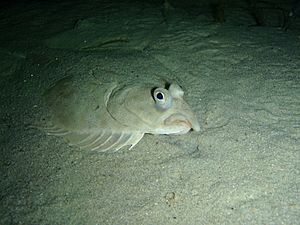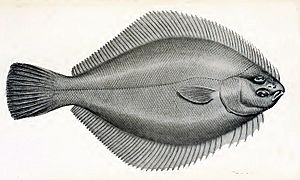Greenback flounder facts for kids
Quick facts for kids Greenback flounder |
|
|---|---|
 |
|
| Scientific classification |
|
| Kingdom: | Animalia |
| Phylum: | Chordata |
| Class: | Actinopterygii |
| Order: | Pleuronectiformes |
| Family: | Pleuronectidae |
| Genus: | Rhombosolea |
| Species: |
R. tapirina
|
| Binomial name | |
| Rhombosolea tapirina Günther, 1862
|
|
| Script error: The function "autoWithCaption" does not exist. | |
| Synonyms | |
|
|
Script error: No such module "Check for conflicting parameters".
The greenback flounder (Rhombosolea tapirina) is a type of righteye flounder. It belongs to the Rhombosolea group of fish. You can find this fish swimming around southern Australia and New Zealand.
Contents
What is a Greenback Flounder?
The greenback flounder is a flatfish, meaning its body is flattened from side to side. It spends most of its life lying on the seafloor. It's called a "righteye" flounder because both of its eyes are on the right side of its head.
How Does it Look?
Greenback flounders have a unique appearance that helps them blend in with the ocean floor.
Body Shape and Size
The first greenback flounder ever described was about 242 millimeters long. This is roughly the length of a standard ruler. Its body is quite deep compared to its length.
Eyes and Mouth
Both eyes of the greenback flounder are on the right side of its head. They are separated by a small, smooth space. The lower eye is a bit in front of the upper eye. Its snout sticks out a little over its mouth. The mouth is of medium size and has two rows of teeth in each jaw.
Fins and Scales
The dorsal fin starts near the snout and runs along most of the fish's back. All its rays are connected by a thin skin, called a membrane. The ventral fin starts under the middle of the eye and connects to the anal fin. The anal fin is similar to the dorsal fin, running along the bottom side of the fish.
The greenback flounder has smooth, overlapping scales covering most of its body. However, some parts, like the front of its head and the edges of its gills, are bare. A special line, called the lateral line, runs almost straight along its body. This line helps the fish sense movements in the water.
Color
The top side of the greenback flounder is usually a uniform grey color. This helps it hide on the seabed. Its underside, which faces the sand, is typically yellow.
Where Does it Live?
Greenback flounders are found in the waters around southern Australia and New Zealand. They live on the bottom of the ocean, often in sandy or muddy areas.
More Information
- Froese, Rainer, and Daniel Pauly, eds. (2006). "Rhombosolea tapirina" in FishBase. March 2006 version.
- Tony Ayling & Geoffrey Cox, Collins Guide to the Sea Fishes of New Zealand, (William Collins Publishers Ltd, Auckland, New Zealand 1982) ISBN: 0-00-216987-8
 | Valerie Thomas |
 | Frederick McKinley Jones |
 | George Edward Alcorn Jr. |
 | Thomas Mensah |


